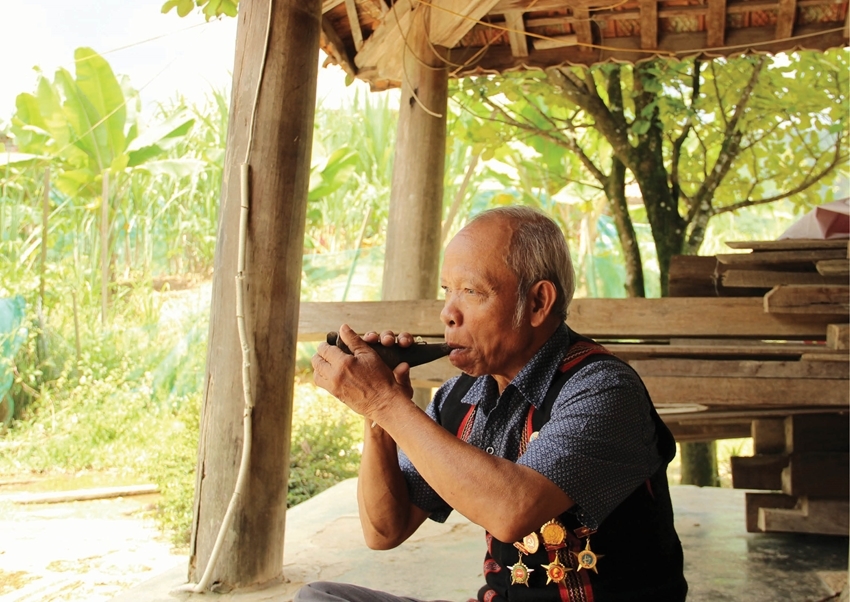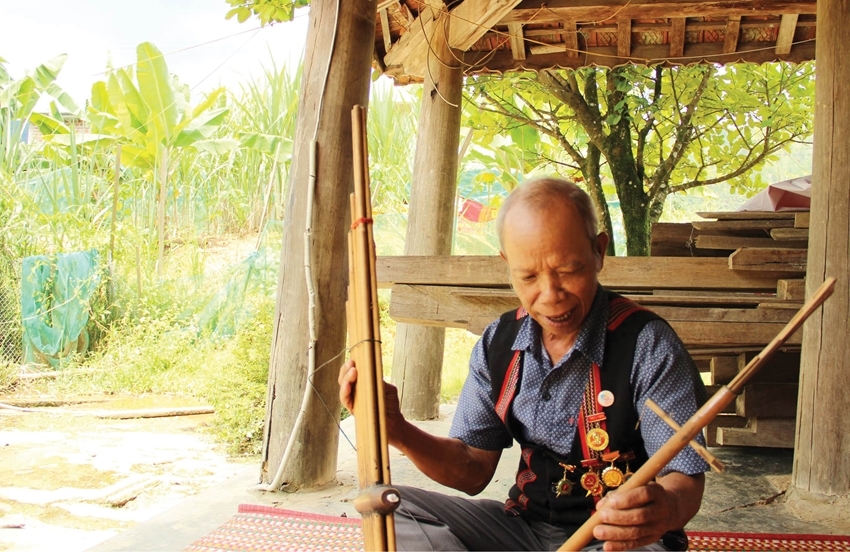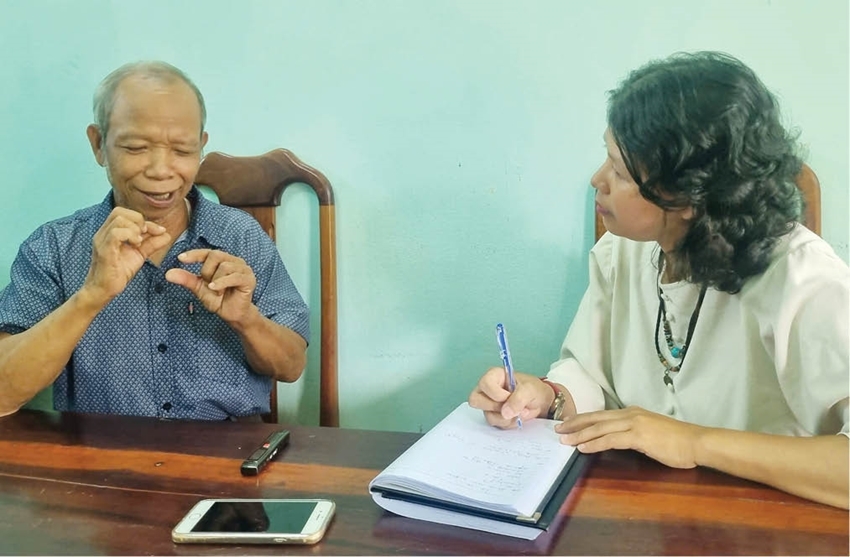 |
| Elder Hanh – a “treasure” in the great forest of Pa Co people |
1. The afternoon rain seems to weave a thin net covering the old wooden house nestled in A Nieng Le Trieng village. Elder Hanh sits by the fire, singing in a deep, hoarse voice. The gentle folk song of Tan i blends with the sound of rain falling on the thatched roof. That soulful sound seems to cross the wind and rain, carving into the mountains. Many people say that the entire life of village elder and excellent artisan Ho Van Hanh (Trung Son Commune, A Luoi District) was devoted to his village and the revolution. When he was young, he joined the resistance war against the U.S. to protect the country. After the unification of his country, he returned to his village and worked in many positions in the locality. When he retired, he devoted all his heart to collecting, restoring, and preserving the cultural values of his people with a passionate love.
During decades of the resistance war against the Americans to protect the country, Pa Co people put aside their festivals to focus on fighting the enemy to protect the country and the village. Then the elder passed away like clouds flying over the mountains whereas the young people grew up, not having the necessary time to continue and preserve the old traditions. The cultural values of ancient Pa Co people, accumulated over thousands of years, gradually faded away. Elder Hanh could no longer remember his footsteps through the many farming seasons, though previously setting foot in all the Pa Co villages. He went to meet the elderly, some of whom had either forgotten or remembered, to listen to their songs, their old stories of the time when their ancestors cleared the forest to make way for the establishment of villages so that the festival seasons were filled with the sound of gongs; the melodious songs of young couples in the middle of the farming season; and the lullabies of grandmothers and mothers in the stilt houses, recounting the hard lives of their parents who relied on cassava, yam, wild bamboo shoots, and dried fish to raise their children to adulthood.
 |
| Elder Hanh being proficient in playing Pa Co musical instruments |
With nonstop footstep of diligently searching and carefully recording, elder Hanh has contributed to the restoration of the cultural beauty of his people. The melodies of Tan i, Tan boi, Cha Chap, Ca Loi, Tan a, etc., the sounds of the Khen (panpipe), the sounds of the A Benl, etc., continue to resound through the festival seasons. “The culture of our ancestors has many good and beautiful things. Once they are gone, there is no way to bring them back, just like the water flowing only once in a river,” mused elder Hanh. The elder gradually departed this life while the young people kept moving forward, hardly ever looking back. According to elder Hanh, it is okay to move forward and integrate, but it is also necessary to preserve and conserve one’s identity. And somehow, thanks to the efforts of people like him, ancient festivals such as A Rieu Ca – the biggest and most sacred festival of Pa Co people, the land worship festival, the seed sowing festival, the village building festival, etc., have gradually been revived in the great forest covered with clouds all year round.
Ms. Bui Thi Ngoc Anh, an expert from the Department of Culture and Information of A Luoi District, said that elder Hanh was one of the few people who had a deep understanding of the culture of ethnic minorities. He is the one who actively worked with the Department of Culture to collect riddles, stories, folk tales, legends, folk songs chants, couplets as well as many festivals of Pa Co people. 20 out of 70 festivals of Pa Co people that have been collected and restored are collected and translated from Pa Co language to Kinh language by elder Ho Van Hanh. “One of the things that always motivates me to work is that I am concerned that the cultural values of our ancestors will be lost if my generation passes away, so I always try to restore the culture of ethnic minorities, mainly the culture of Pa Co people”. Elder Hanh said that “the culture of our ancestors cannot be abandoned. It is my conscience that prevents me from abandoning it completely.”
2. Opening the door of the time-worn wooden cabinet, elder Hanh takes out the panpipes, the tere, the a benl, etc., the musical instruments of Pa Co people that he carefully preserves as if they were the soul of the village and of his people. Not only is he proficient in using the traditional musical instruments of Pa Co people, but elder Hanh also knows how to make the tere and aren (both bamboo flutes) have a gentle sound when blown, just like the sound of the wind blowing through the forest, resounding brightly like the sun on the mountain top. Besides, he knows how to produce a warm sound like the morning sun falling on the hillside using the a benl (similar to the erhu). Though he has a good grasp of using and making musical instruments, very few young people want to learn from the village elder. “Learning these things doesn’t generate income. Only by working in the fields, carrying acacia and cajuput trees can people make money. Young people are busy earning a living, so they don’t have time,” emotionally said elder Hanh.
 |
| Elder Hanh enthusiastically talking about the traditional culture of his people |
Ms. Le Thi Them, Head of the Department of Culture and Information of A Luoi District, said that in the traditional craft classes of Pa Co people organized by the Department of Culture and Information of the district, elder Hanh was always present. Despite his age, the elder that the villagers always respect is constantly passionate about conserving the identity of his ethnic group, passing it on to his children and grandchildren, and preserving traditional values together with them. From carving, pottery making, weaving, etc., it seems that there is no aspect of the cultural identities of the village that elder Ho Van Hanh does not understand or know about.
Considered the “treasure” of Pa Co people in A Luoi, in 2017, village elder Hanh led a group of artists representing Pa Co and Ta Oi people to Dong Mo cultural village (Son Tay, Hanoi) to perform, introduce, and recreate the beauty of traditional culture for domestic and foreign delegations for two consecutive years. Village elder Hanh has turned 78 by this farming season, but his smile is always warm and radiant like the morning sun.
On his last arrival in Hanoi in April 2024, elder Hanh received a Certificate of Merit from the Minister of Culture, Sports and Tourism to the village elder, a prestigious person among ethnic minorities in Thua Thien Hue Province, who had made outstanding achievements in preserving, maintaining and promoting traditional cultural values of the local ethnic groups. He was also honored to represent the village elders, village chiefs and artisans of Vietnamese ethnic groups to offer incense and report their achievements at President Ho’s mausoleum. “I told everyone that I had done nothing so special that I was given the privilege to represent 300 delegates of 54 Vietnamese ethnic groups to report to President Ho. Many of them are very good, and they can do much more than me,” elder Hanh smiled shyly but with sparkling eyes.
Being recognized by the State makes it a great pride not for village elder Hanh himself, but for his Pa Co people. He said that it is also a burden of responsibility in his heart, for he needs to be more responsible in preserving and promoting the good identities as well as passing them on to his children and grandchildren after being recognized by the Party and the State.